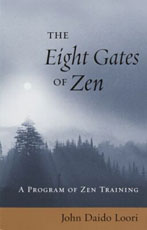"When one only reads about Buddhism, one can come to the conclusion that Zen is amoral, that it considers itself above morality and does not address itself to ethical teachings. That is the view of a person standing on the sidelines, only involved intellectually. Those who truly embrace this practice cannot help but see the intimacy between the Buddhadharma and a moral and ethical life. It is intrinsic to the teaching itself. The life of the Buddha is the manifestation of compassion, but if you do not engage it, it does nothing. It all depends on you. To stand on the sidelines merely thinking about practice is Buji Zen. For the teachings to come alive, they have to be lived with the whole body and mind.
"I feel that because we put such an emphasis on the Precepts, we have a moral obligation to do something about that misconception concerning Zen and morality. There are thousands of Zen practitioners in our country, many thousands who have received the Precepts and taken refuge in the Three Treasures but who don't really know what they've done. They have no idea what the Precepts mean. Try asking someone when you see the little red cord around their neck what it really means to take refuge in the Three Treasures. Ask yourself what it means to take refuge in the Three Treasures. What is refuge? What, really, are the Three Treasures? We say 'Buddha, Dharma, and Sangha,' but what does that mean? Those are the words. What is the reality of Buddha, of being one with the Buddha, being one with the Dharma, being one with the Sangha? It is not some idea. It is a reality, a state of consciousness, a state of being. It is the state of being in harmony with the moral and ethical teachings.
"We live in a time period of considerable moral crisis, with an erosion of values and a fragmentation of meaning prevalent throughout the fabric of the society. The crisis impacts on us personally, as a nation, and as a planet. The injuries that we inflict on each other and on our environment can only be healed by sound moral and ethical commitment. That doesn't mean being puritanical. It doesn't mean being 'moralistic.' These Precepts have a vitality that is unique in the great religions of the world. They are alive, not fixed. They function broadly and deeply, taking into account the intricacies and subtleties of conditions encountered through intimate identification.
"There is so much to learn. The Precepts are incredibly profound. Don't take them lightly. They are direct and confrontive, and they are subtle. Please use them. Press up against them. Push them. See where they take you. As you explore their edges in your own encounters, and discover problems, bring those problems to dokusan as a koan. I'll be happy to teach you.
"Whether you have taken the Precepts or not, whether or not you even intend to, you are free to use them. When you have been using them, when you feel they are part of your life and are at ease with working with them, then the Precepts have been transmitted and received. That is the time to do the ceremony. So, please take them. Make them your own. They are no small thing, by any measure. They nourish, they heal, and they give life to the Buddha."
